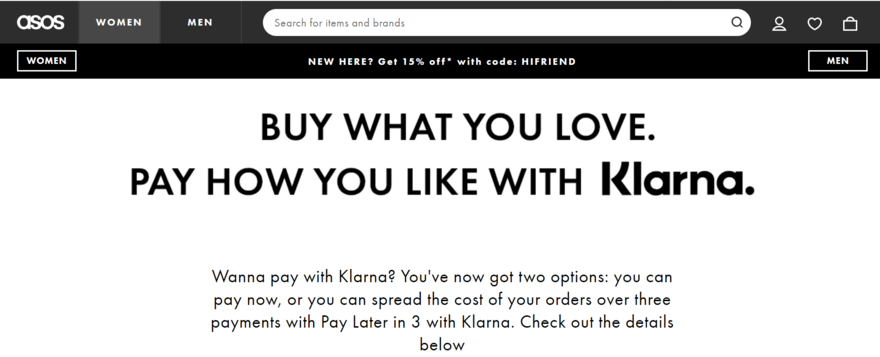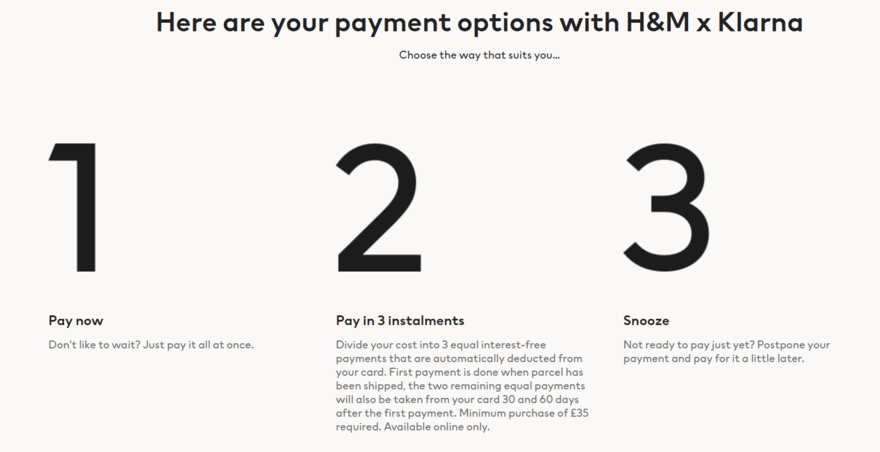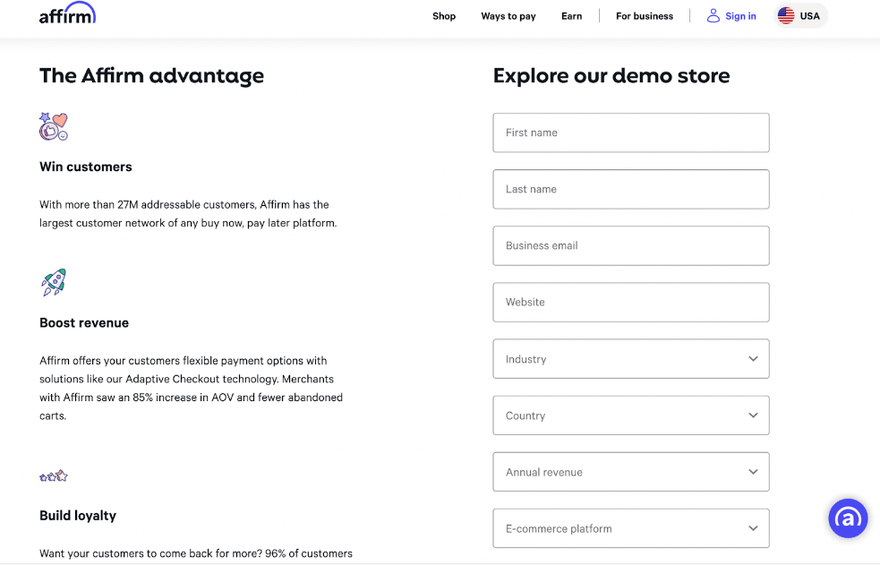What Is Buy Now Pay Later and Should You Offer It to Your Clients?
If you click to purchase a product or service based on our independent recommendations and impartial reviews, we may receive a commission. Learn more
If you’ve opened your store and started to accept payments online, you’ve probably come across the term Buy Now Pay Later. But what is it?
Buy Now Pay Later is a simple solution to a common problem.
Anyone who has ever borrowed 10 bucks from their best friend to cover a pizza or has grandparents who cry when they fondly remember Layaway understands the appeal of Buy Now Pay Later. And as customers most of us can remember a time where we really wanted to buy something but didn’t have the money there and then.
So we missed out. But we all still think about that item too, right? But the great news is with Buy Now Pay Later (BNPL) your customers no longer have to go through that with your fabulous products. They’ll be able to get that gorgeous thing they want or need, helping to attract customers to your online store time and time again.
But what is Buy Now Pay Later? And should you be offering it to your own customers? In this article we’ll explain how it works and lay out the pros and cons to help you decide.
What Is Buy Now Pay Later?
Buy Now Pay Later (BNPL) is a service which allows your customers to get the goods or services they want now, while providing them with a plan to pay at a later date (or dates).

How Does Buy Now Pay Later Work?
Right now most people are dealing with the highest cost of living so salaries just don’t go as far as they used to. Freelancers are paid irregularly. New employees have to wait a while before that first payment comes in. Younger customers might not yet have established credit for a credit card.
Whatever the circumstance, customers appreciate an online business that understands that sometimes customers need a helping hand. BNPL makes your products suddenly become more accessible. And the best thing is that you as a retailer will always be paid upfront. You don’t have to worry about collections or late payments.
Retailers
Buy Now Pay Later is great for retailers and relatively easy to add to your online store’s payment options. It’s a tailored process that depends on which providers you use as well as which platform hosts your website.
Once you decide which provider (or providers) to go with, you’ll go through a membership and financial process on their website and then you’ll have to enable BNPL in your online store provider’s website.
Customers
Generally speaking, it’s easier to qualify for Buy Now Pay Later than it is for a credit card or a large loan. Most companies often offer interest-free repayments as long as payments are made on time too. Sometimes customers enjoy the option to choose how long the repayment time period is.
Customers should be aware that if they miss payments, these types of things happen:
- Additional payments
- More interest
- Strikes on the credit report
- A knock-on effect that hurts other payments
The great news is the payments come automatically so customers don’t have to think about it. But that’s the bad news too. It’s easy to financially spread yourself too thin, so customers should ask themselves if they would make the purchase if BNPL wasn’t an option.

Advice from the Experts
Top Tip: Check if your BNPL choice is available for your customers in US territories, not just the 50 states.
Types of Buy Now Pay Later Plans
There are a variety of Buy Now Pay Later plans that suit a customer’s individual needs. These include:
- Scheduled payments – Most BNPL companies offer a structured payment system of 3-6 payments where money is taken via Direct Debit out of the customer’s bank account.
- One-off payment – Some companies offer a deadline, and customers simply pay off the balance before then.
- Pay Now and Later – Some plans take an upfront payment and then require further payments through time.
Advantages and Disadvantages of Buy Now Pay Later
There are multiple pros and cons to Buy Now Pay Later scheme for brands:
| Pros | Cons |
|---|---|
| Customers can avoid repayment fees | Retailers can pay steep fees |
| Customers spend more in an online store | Overextended customers won’t be able to buy from you until their balance is cleared |
| Customers can build a credit rating if they keep up with their payments | Customers can damage their credit rating if they miss payments |
| It’s convenient for both customers and retailers | |
| It’s easy to set up |
Advice from the Experts
Top Tip: It’ll help your customers if you remind them that setting up a BNPL with a credit card means they are still responsible for the credit card interest.
Best Buy Now Pay Later Services
BNPL is very popular, used by 50% of online customers. The BNPL market is currently worth $150 billion and is still steadily growing. BNPL makes retailers money, increasing conversion rates 20% to 30%, and the cart total between 30% to 50%. It also helps avoid the potential fraud and payment default that can come with retailers handling deferred payments on their own.
There are lots of Buy Now Pay Later options for your customers, and you don’t have to limit yourself to just one. Whichever way you go depends on your products, how much in fees you want to pay, your customers’ needs, and where they’re located – some platforms are more popular than others depending on the country.
Of course which BNPL service you choose will vary depending on your needs and brand. Here are some of the most popular services in the USA:
Afterpay
Afterpay has lots to offer your customers. It’s very easy to create an account – your customers only need to give their name, address, email address, and repayment details.
Not only does it split their balance into four interest-free repayments (Afterpay chooses the dates), but it takes one immediately, and then each repayment happens each two weeks after that. It now offers a monthly repayment plan which covers transactions up to $4,000. Retailer’s fees are 4 to 7 percent and $0.30 per transaction.
Advice from the Experts
Top Tip: Nearly 75% of BNPL customers are Millennials or Generation Z, so if your products target these audiences, it’s a no-brainer.
Affirm
Affirm is probably the most customer-friendly of the companies. Customers can choose their repayment plan and there are no annual fees, late fees, or compound interest rates. Payments outside the four-payment model are subject to a financing fee which is calculated as a percentage of the purchase.
Because of the flexibility, Affirm is popular with customers who tend to miss payments, and those buying more expensive items. It will charge you a per-transaction fee of $0.30 and a rate of typically 5.99%.

PayPal
PayPal has the advantage of brand recognition and trustworthiness. Customers are likely to already have a PayPal account – you may have already set up an online store with PayPal yourself – which means it will be virtually automatic to set up BNPL. In fact, customers are often offered a BNPL deal at checkout before they’ve applied for one.
It’s extremely popular and gives the customer a much larger spending limit of $10,000. There are different repayment options including pay-in-three (no interest, no fees for your customers) and a pay over six, 12, and 24 months (with interest). There are no late fees. As a merchant you’ll pay 1.9% to 3.49% plus 50 cents per transaction.
Advice from the Experts
Top Tip: The top product categories for BNPL are electronics, apparel and furniture.
Klarna
Klarna is used by 150 million customers in 45 countries around the world, making it the most popular BNPL platform in the world. Usually it plans three payments, including one on the day of purchase over the course of six weeks, but there is quite a lot of flexibility too. Customers pay interest on the long-term repayment plans and late payments will incur late fees.
Customers can spread out payments over the course of 36 months, which is great if your products are on the expensive side. But merchant fees can get a little high – 3.29% to 5.99% + $.30 for each transaction.
Sezzle
Customers with no established credit are drawn to Sezzle because there’s no minimum score needed and it allows them to slowly build up their credit rating. Sezzle offers a “pay-in-four” plan interest fee but like most of the other platforms, there are fees for late payments which can get complicated. Keep your eyes open – Sezzle is also known for frequently changing its terms.
Sezzle isn’t the most appealing option for retailers because it’s more limited in which vendors can use it. It also charges an eye-watering 6% + $.30 per transaction fee.
Advice from the Experts
Top Tip: Make sure you choose the programme with the best late fee system for your customers. The easier it is for them to pay off their balance, the quicker they’ll be able to return to you.
Summary
There’s no doubt that Buy Now Pay Later brings big benefits for retailers. Given that 60% of consumers say they will most likely use Buy Now Pay Later in the near future, BNPL will continue to be a big part of the future landscape of ecommerce.
Customers always value flexibility and enabling them to shop your products with the ability to pay at a later date can work for everyone involved. As long as you stay aware of the ethics of offering your customers credit, you’ll have happy customers that return to you again and again.


Leave a comment